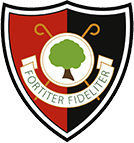English
SPIRITUAL, MORAL, SOCIAL AND CULTURE IN ENGLISH
English is essential for supporting students becoming independent learners, raising their self-esteem, achieving their potential and preparing them for adulthood.
Spiritual Development
Creative writing and the study of poetry across each key stage gives our students the opportunity to reflect on their own beliefs and helps them to establish their own relationship with language.
- War Poetry (KS3)
- AQA Poetry Cluster (KS4)
Writing is expressive and allows for a reflective process and the freedom to be creative and experiment.
- Empathetic Writing (KS3 and KS4)
Moral Development
Our class novels studied across each key stage deal with moral questions, such as race and homelessness, giving students the opportunity to produce their own writing.
Each of the studied texts encourages moral thinking through the recognition of values such as good will, humility and kindness.
Students are able to analyse character to explore the consequences of actions.
- ‘The Hunger Games’ (Year 7)
- ‘Maze Runner’ (Year 8)
- Gothic short stories / ‘Frankenstein’ (Year 9)
- ‘Of Mice and Men’ (Year 9)
- ‘A Christmas Carol’ (Year 10)
- ‘Macbeth’ (KS4)
Writing non-fiction texts such as newspaper articles, leaflets, reports and reviews helps to develop students’ ability to apply fiction to real life scenarios.
During the study of fiction, students are given the opportunity to consider different perspectives and empathise with other characters.
Social and Cultural Development
Social expectations of formal language:
- Poetry by Heart (KS3)
- Spoken Language (KS4)
English lessons promote cooperation and teamwork through working in groups, listening to presentations and asking questions.
Real issues encourage students to think about the world outside of school and give opinions on topics that may affect them in the future. Students are required to take on a role and argue a point of view.
Students learn about respecting others through our studied texts:
- ‘Lord of the Flies’ (KS4)
- ‘Blood Brothers’ (KS4)
We also give students the opportunity to speak in different contexts and regarding a range of different real life issues, applying learning to careers and life after school. Peer assessment is an integral part of our teaching and we encourage focused feedback between students, whereby they support and encourage each other, reflecting and giving advice.
Students are all given the opportunity to be independent, self-reliant and responsible for their own learning. Debate is an important aspect of the subject, giving logical arguments with respect, rationality and thoughtfulness.
British Values
In all lessons we promote one or more of the powerful learning characteristics of resilience, resourcefulness, reflection, creativity, courage, and/or collaboration. Students discuss faith and build respect and tolerance for different faiths through the study of poetry written by a range of poets and writers with different beliefs.
The role of democracy is considered when reading dystopian novels. In Year 7, students read The Hunger Games and in Year 8 – The Maze Runner. Some students in Year 8 alternatively study Animal Farm during which they consider different models of government. Individual liberty is discussed in Year 9 in the study of ‘Of Mice and Men’ and ‘Frankenstein’, along with consideration of our responsibilities and rights.



